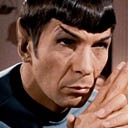Book Review: The Fountainhead by Ayn Rand
As I mentioned in my recent review of Chesterton’s essays, Ayn Rand’s novels had a big impact on my thinking during my adolescence. I was inspired by the audacity and clarity of her thought as demonstrated by both of her two main works of fiction The Fountainhead and Atlas Shrugged. I also read many of her essays but honestly it was her novels that I remember most strongly. Of the two, The Fountainhead I think overall is more impactful as Atlas Shrugged will over stay its welcome with most readers clocking in at over 1000 pages.
The Fountainhead is the story of two architects, one named Howard Roark and the other named Peter Keating. The former is a genius innovator who struggles to get along in modern society. The latter is a social butterfly of marginal talent who manages to achieve far greater fame and wealth than his rival. The two compete not only over building design but also over the affection of a beautiful woman named Dominque. However the core theme of the book isn’t related to a love triangle or business competition; rather Rand’s main point is on the struggle of creative minds in a stifling and collectivist society.
The book appeals strongly to the ego. It is easy to understand how young and talented people can see themselves in Howard Roark. Roark’s journey shows us how paradoxically difficult it is in life to simply do the thing you most want to do. I will always remember the great moment near the end when Roark agrees to help Peter design a building and he offers to let him keep all the money and fame. He tells him, (paraphrasing) “You can have all the money, accolades, awards, gratitude, fame — all the things society can give a man. I only want the one thing society can not give a man; I will have created this building.” That idea of being genuinely inspired by your own work to the point where the work itself is its own reward really made a big impact on my life.
There is a larger secular philosophical system embedded in The Fountainhead and ultimately fully articulated in Atlas Shrugged. If you are of the more libertarian capitalist atheist persuasion it will resonate with you strongly. Rand’s philosophical system, revealingly termed by her “Objectivism”, is a philosophy of individualism and money worship taken to a superlative degree. She argues it with fierce rationalism and paints a picture of an idealized world liberated from all forms of group obligation be it religion, family, government, economics, or history. Given her own personal experience coming of age in Russia right after the Communist revolution it is perhaps understandable her fierce anti-collectivist views.
The Fountainhead I think speaks to this heroic individualist ideal in all of us. My time working in Silicon Valley taught me that Rand’s thinking has a lot of adherents among the young technocrat class. Many see a Rand-style hero in Steve Jobs, Mark Zuckerberg, Elon Musk, Bill Gates, etc. They hope to become like these innovative powerful men by channeling the intransigent spirit of Howard Roark as he defies society’s conventions.
I am grateful for having read The Fountainhead as a teen. It motivated me to do well in school and have big dreams. However my own personal philosophy evolved away from Rand’s once I graduated college and traveled around the world. As a 21 year old in Japan I noticed something very simple: Human beings revel in their collectives — they enjoy their unchosen racial, national, sexual, and familial affiliations. The vast majority of human beings don’t want to be atomized individuals with a life devoted solely to competing in a market place. Many prioritize other things, such as spiritual devotion, strengthening a family name, being a stay at home mom, political advocacy, or just enjoying day to day life as it comes.
Rand’s is a world of chiseled marble statues, immaculate, cold, and perfect. It is not a world of human beings with all of their complex biology, baggage, and mess. It is revealing that the settings in Atlas Shrugged and The Fountainhead have no children, no families, practically no concept even of nations, races, or religion. Children especially don’t fit in her world. Her entire philosophical system breaks down once it has to account for human biological diversity, inborn proclivities, familial obligations, ethnic loyalties, and concern for both tradition and posterity.
The philosophy aside, I’ll also say that The Fountainhead is a mixed bag in terms of the writing. The book is overlong and the plot meandering at times. The dialogue is awkward in parts. This is partly due to the author’s ideology and the fact that the entire book is a thinly veiled philosophical treatise. Though it could easily have been edited down a couple hundred pages into a tighter narrative, the strength of the ideas still made it an enjoyable read for me.
I still recommend Rand to people interested in philosophy not because I hope they will adopt her ideology but rather because of the quality of her arguments and her ability to sharply challenge conventions. She is one of the more eloquent and consistent secular materialists. I see much of her thinking returning now in the age of AI as the big tech thought leaders dream of technology actually turning us messy humans into those perfect cold marble statues.
Whether you are a skeptic of all that or not, Rand makes for a worthwhile read.
Grade: B+
